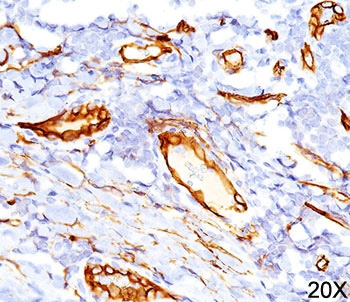- Tel: 858.663.9055
 Email: info@nsjbio.com
Email: info@nsjbio.com
- Tel: 858.663.9055
- Email: info@nsjbio.com
Granulocyte Marker Antibody reagents target proteins expressed by granulocytes, a category of white blood cells that includes neutrophils, eosinophils, and basophils. Granulocytes are named for their cytoplasmic granules, which contain enzymes and mediators critical for immune defense. These cells play essential roles in innate immunity, host defense against pathogens, allergy, and inflammation.
Key markers for granulocytes include CD15, CD16, CD66b, myeloperoxidase (MPO), and eosinophil peroxidase. Neutrophils dominate acute responses to bacterial infection, eosinophils are central to parasitic defense and allergy, while basophils contribute to inflammatory responses and histamine release. The Granulocyte Marker Antibody provides precise detection of these proteins, while Granulocyte Marker Antibodies more broadly support research in immunology, hematology, and translational medicine.
NSJ Bioreagents supplies Granulocyte Marker Antibodies validated for immunohistochemistry, flow cytometry, western blotting, immunofluorescence, and ELISA. Each Granulocyte Marker Antibody undergoes rigorous testing for specificity and reproducibility.
By selecting Granulocyte Marker Antibodies from NSJ Bioreagents, researchers gain reagents optimized for consistent results across multiple applications. Our antibodies provide clear staining in blood smears and tissue biopsies, accurate protein detection in lysates, and strong performance across immunoassays. Detailed datasheets, recommended controls, and validated protocols support robust and reproducible outcomes.
The Granulocyte Marker Antibody is widely applied in basic research, clinical pathology, and translational studies.
Granulocyte Marker Antibodies identify neutrophils, eosinophils, and basophils in tissue and blood.
The Granulocyte Marker Antibody helps clarify granulocyte development and differentiation.
Granulocyte Marker Antibodies support studies of host defense against bacteria, parasites, and fungi.
Granulocyte Marker Antibodies detect eosinophil and basophil markers in allergic disease.
The Granulocyte Marker Antibody supports studies of asthma, rhinitis, and hypersensitivity.
Granulocyte Marker Antibodies validate biomarkers for chronic inflammatory disorders.
Granulocyte Marker Antibodies identify granulocytic lineage in myeloid leukemias.
The Granulocyte Marker Antibody distinguishes acute myeloid leukemia (AML) subtypes.
Granulocyte Marker Antibodies support classification of hematologic malignancies.
Granulocyte Marker Antibodies are applied in models of bacterial sepsis and fungal infection.
The Granulocyte Marker Antibody highlights recruitment of granulocytes to infected tissues.
Granulocyte Marker Antibodies provide diagnostic clarity in bone marrow biopsies.
The Granulocyte Marker Antibody supports routine pathology panels for hematology.
Granulocyte Marker Antibodies are applied in biomarker discovery for immune-related conditions.
The Granulocyte Marker Antibody supports patient monitoring in inflammation-focused clinical studies.
Granulocyte Marker Antibodies help evaluate therapeutic modulation of granulocyte activity.
Granulocytes are indispensable for immune defense and inflammatory processes. The Granulocyte Marker Antibody provides researchers with a powerful tool for detecting granulocyte-specific proteins, while Granulocyte Marker Antibodies more broadly support immunology, hematology, and translational research.
In basic science, these antibodies clarify granulocyte biology, development, and function. In inflammation and allergy research, the Granulocyte Marker Antibody highlights eosinophil and basophil activity. In oncology and hematology, Granulocyte Marker Antibodies distinguish myeloid leukemias and inform patient diagnosis.
Clinically, granulocyte markers are important in diagnosing hematologic malignancies, monitoring infection, and studying immune dysregulation. By providing reproducible results, the Granulocyte Marker Antibody bridges laboratory research with patient care.
Granulocytes play a central role in innate immunity, allergy, and disease. The Granulocyte Marker Antibody equips researchers and clinicians with a reliable reagent for detecting granulocyte-specific proteins, while Granulocyte Marker Antibodies more broadly support advances in immunology, oncology, and translational medicine. By connecting molecular research with clinical relevance, these antibodies remain indispensable tools for advancing science and improving patient outcomes.

IHC staining of human tonsil tissue with CD34 antibody (clone QBEnd/10).
